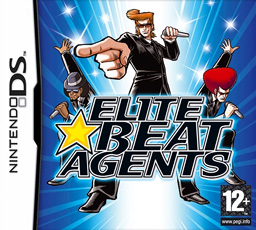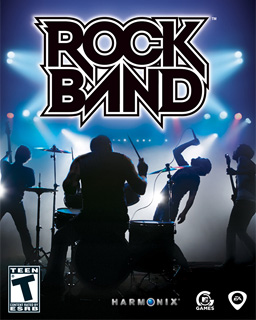
Frequency is a music video game developed by Harmonix and published by SCEA. It is the first major release from Harmonix. It was released in November 2001. A sequel, Amplitude, was released in 2003.

Amplitude is a music video game developed by Harmonix for the PlayStation 2. It is the sequel to Frequency. The game was released in 2003 for North America on March 24 and for Europe on September 26.

DJMax is an action-rhythm video game series created by Neowiz MUCA. Games feature mostly experimental music and visual art from Korean DJs, artists and composers. Known South Korean experimental group Clazziquai Project has also made songs for the series. There are also a few Japanese composers who have given significant contributions to the series.

Guitar Hero is a 2005 music rhythm video game developed by Harmonix and published by RedOctane for the PlayStation 2. It is the first main installment in the Guitar Hero series. Guitar Hero was released in November 2005 in North America, April 2006 in Europe and June 2006 in Australia. The game's development was a result of collaboration between RedOctane and Harmonix to bring a Guitar Freaks-like game to United States.

Elite Beat Agents is a music video game developed by iNiS and published by Nintendo for the Nintendo DS handheld game console. It was released in North America, Europe and South Korea. As the second of three rhythm games developed by iNiS specifically for the DS, it is the spiritual sequel and international counterpart to Osu! Tatakae! Ouendan, a Japanese rhythm game released in 2005, sharing many common elements with it.

Rock Band is a music video game developed by Harmonix, published by MTV Games and distributed by Electronic Arts. It is the first title in the Rock Band series. The Xbox 360 and PlayStation 3 versions were released in North America on November 20, 2007, while the PlayStation 2 version was released on December 18, 2007 and the Wii version on June 22, 2008. Harmonix previously developed the first two games in the Guitar Hero series, which popularized gameplay of rock music with guitar-shaped controllers. After development of the series was shifted to Neversoft, Harmonix conceived Rock Band as a new title that would offer multi-instrument gameplay.

Guitar Hero World Tour is a music rhythm video game developed by Neversoft and published by Activision. It is the fourth main installment in the Guitar Hero series. The game was launched in North America in October 2008 for the PlayStation 2, PlayStation 3, Wii, and Xbox 360 consoles, and a month later for Europe and Australia. A version of World Tour for Microsoft Windows and Mac OS X was later released by Aspyr.

Rock Band 2 is a 2008 music video game developed by Harmonix, published by MTV Games and distributed by Electronic Arts. It is the sequel to Rock Band and is the second title in the series. The game allows up to four players to simulate the performance of popular songs by playing with controllers modeled after musical instruments. Players can play the lead guitar, bass guitar, and drums parts to songs with "instrument controllers", as well as sing through a USB microphone. Players are scored on their ability to match scrolling musical "notes" while playing instruments, or by their ability to match the singer's pitch on vocals.

Rock Band is a series of rhythm games developed by Harmonix, principally for home video game consoles. Based on their previous development work from the Guitar Hero series, the main Rock Band games has players use game controllers modeled after musical instruments and microphones to perform the lead guitar, bass guitar, keyboard, drums and vocal parts of numerous licensed songs across a wide range of genres though mostly focusing on rock music by matching scrolling musical notes patterns shown on screen. Certain games support the use of "Pro" instruments that require special controllers that more closely mimic the playing of real instruments, providing a higher challenge to players. Players are scored for successfully-hit notes, while may fail a song if they miss too many notes. The series has featured numerous game modes, and supports both local and online multiplayer modes where up to four players in most modes can perform together.

Lego Rock Band is a music rhythm game developed by TT Fusion in partnership with Harmonix and published by Warner Bros. Interactive Entertainment. It is the 4th major console installment of the Rock Band series; it incorporates elements from Lego video games. The game was released on 3 November 2009 for Xbox 360, PlayStation 3, and Wii home consoles in the United States. A Nintendo DS version was also developed in conjunction with Backbone Entertainment.

DJMax Portable Black Square is a music game for the PlayStation Portable developed by South Korean developer Pentavision released on December 24, 2008. This is the fourth major game of the DJMax series released for the PSP. The game includes various enhancements and new features built on from DJMax Portable 2 and DJMax Portable Clazziquai Edition. The original aim was to launch the game in November, however due to numerous bugs or piracy issues with DJMax Portable Clazziquai Edition, the release of DJMax Portable Black Square was postponed. The game was released in Japan on March 22, 2012, it removes the autocorrect feature and Japanese is the only language option available, yet most of the game retains English titles for songs, artwork and so on.

DJ Max Fever is a music game for the PlayStation Portable developed by Pentavision and PM Studios. It was released in 2009. Although the franchise has made several appearances in Asia, DJ Max Fever is the first DJMax released in the United States and Europe. The game is a compilation of DJMax Portable and DJMax Portable 2 along with additional features. By decision of PM Studios, it is the only title in the DJMax series with a space between words "DJ" and "Max". A digital version of the game was released in 2010 on PlayStation Network, but later removed due to licensing expiration.

Rock Band Unplugged is an spin-off of the Rock Band series of music video games released for the PlayStation Portable. The game is developed by Backbone Entertainment in conjunction with Harmonix, published by MTV Games and distributed by Electronic Arts. The game was released in North America and Europe on June 9, 2009.

Rock Band is a music video game released for the iOS. It was co-developed by EA Montreal and Harmonix, and was published by Electronic Arts and MTV Games. The game was released as a part of the Rock Band series for download through the App Store in several regions on October 19, 2009. On May 2, 2012, RockBandAide announced that EA intended to discontinue Rock Band with servers being disconnected and support being dropped on May 31, 2012. However, EA stated that the message was "sent in error" and the app would remain available to those who purchased the app. It was later announced that due to an expiring contract with Harmonix the game would be removed from the App Store. This occurred on July 31, 2012, and the game is now currently unavailable; though users who have previously downloaded the game can continue to play it.

Rock Band 3 is a 2010 music video game developed by Harmonix. The game was initially published and distributed by MTV Games and Electronic Arts, respectively, in late October 2010. Mad Catz took over both roles and re-released the title on November 23, 2011. It is the third main game and the 6th major console installment in the Rock Band series. As with the previous titles, Rock Band 3 allows players to simulate the playing of rock music and many other subgenres using special instrument controllers mimicking lead and bass guitar, keyboard, drums, and vocals. Rock Band 3 expands upon previous games by including three-part vocal harmonies — previously used in The Beatles: Rock Band and Green Day: Rock Band — plus support for MIDI-compatible keyboards, electronic drumkits, and even use of a real guitar in "Pro" mode.

DJMax Portable 3 is a music game for the PlayStation Portable published and developed by Pentavision in South Korea, and is a sequel to the earlier DJMax Portable games. DJMax Portable 3 was announced shortly after DJMax Technika 2 was announced. The official trailers from PM Studios and Pentavision quickly followed. It is the seventh installment of the game for the PlayStation Portable, and regarded as the actual sequel to DJMax Portable 2 since Clazziquai and Black Square branched out for the METRO Project in 2008, Fever for the North American release and the Technika series globally.

Michael Jackson: The Experience is a music video game based on Michael Jackson's songs. It was developed and published by Ubisoft, and was released on 23 November 2010 in North America, 25 November 2010 in Australia and 26 November 2010 in Europe for the Nintendo DS, PlayStation Portable, and Wii. It was also released on 12 April 2011 in North America, 14 April 2011 in Australia and 15 April 2011 in Europe for PlayStation 3's PlayStation Move and Xbox 360's Kinect. The Japanese release on 8 December 2011 only revised the PlayStation 3, Xbox 360, and Wii consoles. The game features many of Michael Jackson's hits, such as "Bad", "Thriller", "Beat It", "Billie Jean", "Smooth Criminal", "Black or White", "The Way You Make Me Feel", etc. However, some songs like "Man in the Mirror" and "P.Y.T. " are excluded. Initial launches of the game included a limited edition replica of Jackson's sequined glove. It was later released for the Nintendo 3DS on 7 November 2011 in North America and 11 November 2011 in Europe, for iPhone and iPad on 7 December 2011 in North America and for PlayStation Vita on 15 February 2012 in North America, 22 February 2012 in Europe and 23 February 2012 in Australia. It was announced that the game would be released on Mac OS X, and iPad 2. The game sold 2 million units in two months, not including Japanese sales, making it one of the best-selling Wii title games.

Rock Band Blitz is a rhythm game in the Rock Band series from Harmonix as a downloadable game for Xbox Live Arcade and PlayStation Network, released in August 2012. Unlike previous iterations of Rock Band, Blitz is not sold with any special instrument controllers, and was designed to use regular console controllers to match notes in a song, using gameplay mechanics similar to Harmonix' previous titles of Frequency, Amplitude, and Rock Band Unplugged. In addition to 25 songs that will ship with the game, the title is capable of using any songs the player has downloaded or exported for Rock Band 3. Due to music license expirations, the game was delisted from the PSN and Xbox Live storefronts on August 28, 2017.
Rhythm game accessories are often required to play rhythm games available for various consoles, such as the PlayStation 2, PlayStation 3, Wii, and Xbox 360. These include dance pads, guitar controllers, drum controllers, microphones and turntable controllers. With the exception of microphones, these controllers can generally be used to control any game, but have limited inputs, making them impractical for most games.

The Groove Coaster series is an iOS / Android and arcade rhythm game franchise developed by Matrix Software and published by Taito. The first Groove Coaster was released for iOS on July 28, 2011. This rhythm game follows a roller coaster type track on screen, where players must make the appropriate controller inputs. Like many rhythm games, a life bar is attached to the game play. Players gain or lose points on the bar depending on the input timings.


















